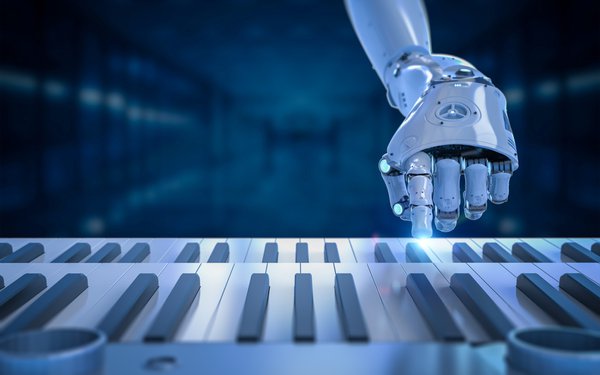
Kraftwerk, a pioneering musical group from Germany, is
known for their innovative use of electronic signals in the mid-1970s, with unique ways to create sound.
From that sound using a voice coder, the group created the album Radio-Activity,
released in 1974. It featured Autobahn with the work of percussion team Karl Bartos and Wolfgang Flur. In this type of music, the human voice acted as a
modulator signal, and a synthesizer or other sound source acted as the carrier of the music.
The transition of music from instrumental to synthesized, which I was lucky
enough to hear at the time, reminds me of OpenAI's work with New York’s Juilliard School of Music. The two reportedly are working on a generative AI (GAI) music creation tool.
advertisement
advertisement
It it
not known whether the project will lead to a stand-alone tool or be integrated into an OpenAI product like Sora to create music for commercials, from video to television. One thing is certain --
a tool like this would allow advertisers to add music to video or soundtracks for clips without charging royalties for the music.
This could be OpenAI's continuation of Jukebox, a
neural net that generates music, which the company introduced in 2020. A neural net is a computing system inspired by the human brain that learns to recognize patterns and makes predictions. For
example, patterns in music could trigger a response from a human when combined with music and visuals.
When OpenAI released Jukebox, it included rudimentary singing and raw audio in a variety of genres and artist styles. This gave OpenAI an entrance into music, along with Google's
Lyria RealTime, a model that can mix and shift music genres in real-time through the Gemini API.
Lightspeed Venture Partners-backed Suno also creates AI-generated music with vocals and
instrumentals from text prompts. The company was founded by musicians and AI experts Mikey Shulman, Georg Kucsko and Keenan Freyberg.
Suno today generates more than $100 million in annual recurring revenue, according to Bloomberg, citing people with knowledge of the
situation.
The rise of GAI music tools, like the one reportedly being developed by OpenAI and the Juilliard School, has several significant implications for advertisers. The core
benefit is a shift toward a more cost-effective, personalized, and efficient way to create music for advertisements and commercial projects that does not include royalties.
Imagine if audio
could be created on the fly and change in real-time based searches or movements of consumer behavior as they traverse the web. The audio would read prompts, and companies responsible for this
technology could analyze consumer behavior in real-time on the web to adapt the music. I don't believe one company can do all this, but a handful can do one or two of these functions.
A quick
search in Google AI Mode found AdTonos, a programmatic audio advertising company using AI to create dynamic
audio ads that adapt in real-time based on listener data.
Yahoo seems to use dynamic
creative optimization (DCO) to create audio ads that respond to listener context, including location, weather, and musical taste. This is an application of combining consumer behavior with real-time
audio, but it does not create music.
Some posts on Reddit suggest licensing music is a "super lengthy and complex" process. They cite custom music as an easier process.
The shift to AI-generated
music is not a positive for everyone. AI's use of copyrighted music for training, voice replication, and potential dilution of artists' royalty pools have prompted lawsuits and calls for
new legislation, and there have been takedown requests and infringement lawsuits.
Universal
Music Group (UMG), Sony Music Entertainment, and Warner Records have filed lawsuits against AI music startups Suno and Udio.
They allege that Suno and Udio illegally trained AI models on
massive libraries of copyrighted music without permission or compensation. The lawsuits seek significant damages, with some demanding up to $150,000 per infringed work.
My MediaPost colleague
Wendy Davis wrote about it here. "The record labels claim in
the complaints that Suno and Udio must have copied and 'ingested' popular recordings in order to be able to generate material in particular styles," Davis wrote.
Davis said independent
artists have also sued. A proposed amended complaint against Udio was filed last week by independent artists.